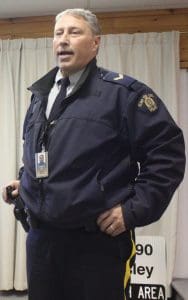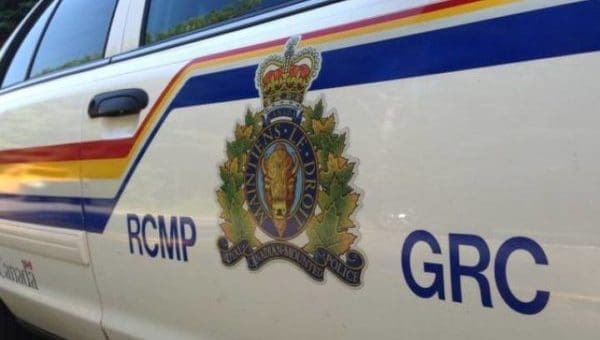Kenneth Brown
of The Clarion
Property crime in rural areas is a growing concern, so the Rural Municipality of Kindersley is encouraging its citizens to start a Rural Crime Watch group.
The RM of Kindersley held an information meeting on Nov. 7 at the Masonic Lodge. About 30 people attended the meeting, where a member of the RCMP’s Crime Prevention and Crime Reduction unit spoke about the Rural Crime Watch program.

Cpl. Mel Zurevinsky of the RCMP’s Crime Prevention and Crime Reduction unit talks to a crowd of about 30 people about the Rural Crime Watch program on Nov. 7 at the Masonic Lodge in Kindersley.
Lorne Pincemin, a councillor in the RM of Kindersley, welcomed people to the meeting and introduced the speaker, Cpl, Mel Zurevinsky. The councillor said local officials heard the officer’s presentation at a Saskatchewan Association of Rural Municipalities (SARM) convention.
The councillor said there used to be a Rural Crime Watch group in Kindersley and he could recall seeing the signs when he was growing up in the area. He noted that officials wanted to see if there’s interest in re-establishing the group.
Zurevinsky, who was joined at the meeting by Sgt. Ray Blais of the Kindersley RCMP, said he was born and raised in Saskatchewan. He said he also operates a cattle and haying operation with his son in the RM of Colonsay.
The corporal said he became interested in the Rural Crime Watch program in 2016 after crime started to increase in his area. He said he and friends had batteries and fuel stolen, so he reached out to the commanding officer for F Division with hopes of rejuvenating the prevention program.
“We started doing some research,” he said, explaining that Rural Crime Watch was more popular in the early to mid 2000s and interest declined by the end of the decade. “When I started to do some research in 2016, there were only four programs running in the province.”
The province’s Crime Prevention and Crime Reduction unit worked to revise the program, Zurevinsky said. Through his research, he discovered that Alberta, Manitoba and British Columbia have a different system for the program.
[emember_protected for=”2″ custom_msg=’For more on this story, please see the Nov. 15 print edition of The Clarion.’]
Zurevinsky said the signs cost $20 for a one-by-one foot sign and $40 for a two-by-two foot sign. The larger signs are placed along roads. He said he has done roughly 30 presentations across the province and about 55 rural municipalities are considering programs, so “it’s slowly getting revitalized.”
He said the RM of Edenwold, a municipality just east of Regina, has a successful Rural Crime Watch program. Edenwold was one of the four municipalities in Saskatchewan with an active program prior to 2016. The group there has about 90 members.
Members in Edenwold use WhatsApp, an application for mobile devices. If a member notices suspicious activity or vehicles, the member posts on WhatsApp to alert the other members.
A group in the Biggar and Perdue area uses a Facebook page to post alerts, but research by SARM has found that WhatsApp works the best, the corporal said. He noted that SARM has helped out with signs for the program. Edenwold has become the benchmark for the program.
“In that area, everyone’s got a Rural Crime Watch sign in the driveway and their organization has really pushed for everyone to get some kind of security camera,” he said. He said there’s been less crime in Edenwold than in similar areas such as Martensville and Warman.
Rural crime is on the rise across Western Canada – Saskatchewan is not alone. Regardless of why rural crime is increasing, it’s believed that the Rural Crime Watch program is the best option to help deter crime in rural areas.
Zurevinsky said when criminals see the signs posted around Edenwold, they turn around and drive away. He noted that people in the area have seen it happen. The program works as long as people are vigilant about using it, he said.
The corporal said he carries a small-calibre rifle in his tractor just in case he spots coyotes or gophers when he’s baling hay. He stressed that civilians should never take the law into their own hands by confronting suspicious people with a gun in their hands.
He noted that an organization needs at least one person with the technical ability to manage the application, but also to filter the information that needs to go to the RCMP. There are two RCMP members connected to the WhatsApp program in Edenwold.
“Rural Crime Watch is community-driven, community-led and police-supported,” Zurevinsky said. Each group must set up an executive and assign the technical aspects to a member with the ability to manage the alert mechanism.
The corporal said he heard there’s an active and successful Citizens On Patrol Program (COPP) in Kindersley. The big difference between COPP and Rural Crime Watch is COPP members often have radios and do regular patrols. Rural Crime Watch members only report the suspicious activity they observe.
He spoke about the benefits and challenges of the program, but stressed its importance because the RCMP has its own challenges to police rural areas.
Members of Rural Crime Watch must complete a criminal record check.
Zurevinsky said posts by members about a suspicious vehicle could help RCMP locate the vehicle. A member in one area makes a post and then other members post where they’ve seen the vehicle in the area. A series of posts could allow police to track the vehicle.
After the speaker answered questions, Pincemin thanked him for coming to Kindersley. The meeting was for people’s information, and a second meeting will be called to gauge interest and start forming the organization, the councillor said.

